How I Rid Myself Of The Bad Habit That Was Setting Me Back Professionally

Here, Dawn Quaker, co-founder of Profillic, tells us how she uses time-chunking to reign in her perfectionist tendencies.
What vice/bad habit did you work to eliminate from your routine?
DAWN: I’m over-analytical by nature and it’s something that has impacted me regularly since youth. Eliminating this tendency, though, has never felt like the ‘right’ answer. Rather, reframing how and when I delve into the details has been more adaptive in terms of my personal and professional life.
How did you develop this vice in the first place? Was it something that you battled for a long time, or something that crept over the past year or so?
I guess within the nature verses nurture argument, I would argue it really has always been a part of who I am. I spent most of my childhood and early twenties in a studio dancing, however, so I’m certain the perfectionist ideals and competitive nature of ballet further enhanced that over time. Training can be extremely rigorous and there’s always room for more.
What prompted you to make a conscious effort to eliminate it? How was it negatively affecting your personal and/or professional goals?
I had to (literally) learn to fall. I had begun working at Cedar Lake Contemporary Ballet and Benoit-Swan Pouffer, our director, challenged me to let go and trust that my body (and gravity) and simply fall. It didn’t require thought. It required simplicity. In this case, thinking about it too much, over-analyzing the movement, had the potential to hold me back professionally.
How did you begin to detox yourself from this vice?
The truth is I still love the details, but it’s just not always necessary and has the potential to be maladaptive and slow one down professionally.
I had to teach myself how to filter and categorize information quickly, prioritize the things I felt I needed and/or wanted to know, and then only after that, I can choose to dive-in, disregard or delegate based on that assessment. I also have become very comfortable asking people who have more experience than I do for advice; asking what they did to acquire a certain competencies or how they feel about an issue.
What issues or setbacks did you encounter along the way?
When I stopped dancing and matriculated at Columbia University as an undergraduate, I was initially overwhelmed with information. In early semesters, I took survey courses ranging from social psychology to economics to attic Greek. Unfortunately, given the broad spectrum of the coursework I chose to take and my tendency to be overly-analytical, I would often get stuck in granular and historic information, which while interesting to me, wasn’t necessary to perform well in the class. This meant that despite working a lot and learning a great deal, I would get behind and be rushed to finish assignments by set deadlines. I definitely credit my time at Columbia for teaching me how to learn strategically, harness the positive aspects in analysis, and apply them in a more adaptive manner.
What tools, tricks or other methods did you employ to wean yourself off of said vice?
Firstly, like any vice or potentially maladaptive habit, one has to acknowledge it and be aware of themselves and their tendencies. Meditation and exercise in my opinion are essential in remaining self-aware.
Once you know where you’re at mentally, you can plan. Make time-chunking part of your new routine, and set alarms on your calendar. Even if you have to amend your schedule, time-chunking acts as a check-in, if you’re overly analytical. I know that I can get fully absorbed in things I find interesting or pertinent, but I need to be mindful of where I’m spending my time. Some information may not be necessary to meet specific milestones and obligations, and if it is something that interests you, but is not necessary, you can revisit it at another time.
Dedicating set hours of the day for certain activities or tasks means that I’ll be sure to check-in with myself and can then quickly assess if I’m on track or perhaps going too deeply into something.
What differences have you seen in your personal or professional life since giving up this vice?
My work improved, my career moved forward, and I was genuinely happier. It takes time to break a habit, especially if it’s a natural tendency and I think it’s imperative for anyone trying to do so to embrace incremental learning and also to fully understand the positive and negative aspects of that tendency. Keep the good; work to let go of the bad.
A recent graduate of Columbia University, Dawn’s work focuses on strategic growth and innovation, leveraging the results of rapid experimentation across marketing channels and partnerships to identify the most effective, efficient ways to grow tech-based business initiatives. A co-founder of the AI recruiting tech startup, Profillic, she is a rising thought leader in the future of work and the economics of inclusion, and has spoken at and conducted workshops for various organizations, including Harvard University, UBS & Rent the Runway’s Project Entrepreneur, Columbia University, and JPMorgan. Additionally, Dawn sits on the Global Board of the Columbia Venture Community as East Coast President and is a member of the New York City Department of Education’s Gender Equity Advisory Subcommittee.
Image via Unsplash

